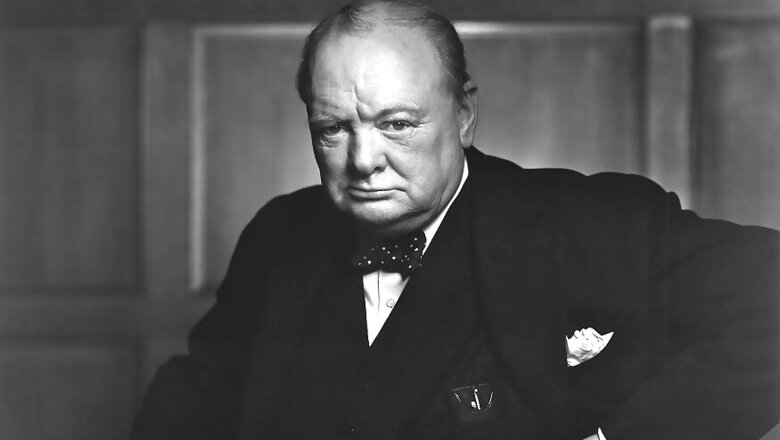
views
Read the first part here.
Churchill was a fanatical advocate of imperialism, and his own words convict him of racism and anti-Semitism. He supported the pseudo-science of eugenics, musing about the idea of sterilizing the “unfit”. He professed scorn for women’s rights and opposed the Suffragettes who sought the vote for women.
What he was interested in throughout his career was personal glory and self-promotion, and the British Empire provided him an ideal platform for that. The revolts and struggles across the Empire were nothing more than, in Candice Millard’s words, “an irresistible opportunity for personal glory and advancement.”
During his “finest hour” — the Second World War, when he had at last become Prime Minister — Churchill declared himself in favour of the “terror bombing” of civilians. He wrote that he wanted “absolutely devastating, exterminating attacks by very heavy bombers”. Horrors like the firebombing of Dresden were the result: he ordered the policy though he did not pick the targets.
Churchill also recommended using chemical warfare against German civilians. “I should be prepared to do anything that would hit the enemy in a murderous place,” he declared in a 1944 letter: “I may certainly have to ask you to support me in using poison gas. We could drench the cities of the Ruhr and many other cities in Germany… let us do it one hundred per cent.”
Another plan, called Operation Vegetarian, called for feeding German cattle anthrax cakes: this would kill the cattle, depriving Germans of milk and beef, but also kill German civilians eating infected cows. The amorality of either course did not unduly trouble Churchill.
Amorality rose to the fore again towards the end of the war, when Churchill approved Operation Keelhaul, forcing the involuntary repatriation of two million people to the USSR, many of whom had never been Soviet citizens. The Russian Nobel laureate Aleksandr Solzhenitsyn was scathing about this, blaming Churchill for “turn[ing] over to the Soviet command the Cossack corps of 90,000 men. Along with them he also handed over many wagonloads of old people, women, and children,” he explained in The Gulag Archipelago.
Similarly the expulsions of Germans from Poland, Czechoslovakia, Yugoslavia, Hungary and Romania were carried out brutally, resulting in great suffering and causing the death or disappearance of over 2.1 million Germans. Churchill was unfazed, telling the House of Commons on 15 December 1944: “Expulsion [of people] is the method which, insofar as we have been able to see, will be the most satisfactory and lasting. There will be no mixture of populations to cause endless trouble … A clean sweep will be made. I am not alarmed by these transferences, which are more possible in modern conditions.”
Moral scruples were never a great part of the Churchill persona. It has been suggested that while his son, Randolph, was away at the front, he got his daughter-in-law Pamela to intimately entertain the American envoy, Averell Harriman (whom she was later to marry). Churchill was untroubled by effectively condoning his own son’s cuckolding, in the larger interests of developing closer relations with the US.
But murder appealed to him far more than sex. In Afghanistan, the bumptious Churchill, whose love of war trumped “such dreary matters as colonial economics”, declared the Pashtuns “needed to recognise the superiority of [the British] race” and that “all who resist will be killed without quarter”. He wrote about how “We systematically, village by village, destroyed the houses, filled up the wells, blew down the towers, cut down the great shady trees, burned the crops and broke the reservoirs in punitive devastation…. Every tribesman caught was speared or cut down at once”.
In Kenya, Churchill either directed or was complicit in policies involving the forced relocation of local people from the fertile highlands to make way for white colonial settlers and the forcing of over 150,000 men, women and children into concentration camps. Rape, castration, lit cigarettes on tender spots, and electric shocks were all used by the British authorities to torture Kenyans under Churchill’s rule.
The actor Richard Burton, cast as Churchill in a television drama, courageously wrote for the New York Times: “In the course of preparing myself, I realized afresh that I hate Churchill and all of his kind. I hate them virulently. They have stalked down the corridors of endless power all through history…. What man of sanity would say on hearing of the atrocities committed by the Japanese against British and Anzac prisoners of war, “We shall wipe them out, every one of them, men, women, and children. There shall not be a Japanese left on the face of the earth”? Such simple-minded cravings for revenge leave me with a horrified but reluctant awe for such single-minded and merciless ferocity.”
Burton was vilified for his honesty and banned from the BBC, but he had put a finger on the undeniable reality of Churchill – his egregious fondness for slaughter in the name of imperial glory.
But the principal victims of Winston Churchill were the Indians – “a beastly people with a beastly religion”, as he charmingly called us. Churchill’s beatification as an apostle of freedom seems all the more preposterous given his explicit declaration in 1941 that the principles of the Atlantic Charter would not apply to India.
Churchill’s notions of freedom and democracy faltered at the frontiers of empire: he was an appalling racialist, one who could not bring himself to see people of colour as entitled to the same rights as himself. “Gandhi-ism and all it stands for,” declared Churchill, “will, sooner or later, have to be grappled with and finally crushed.” He spoke luridly of having the Mahatma tied to the ground and trampled upon by elephants.
In such matters Churchill was the most reactionary of Englishmen, with views so extreme they cannot be excused as being reflective of their times: in fact Churchill’s statements appalled most of his contemporaries. His own Secretary of State for War, Leopold Amery, confessed that he could see very little difference between Churchill’s attitude and Hitler’s.
Churchill’s wartime philosophy was simple: he would exterminate the Japanese, bomb the Germans into the ground, and starve the Indians to death. Thanks to Churchill’s personal decisions, some four million Bengalis died of hunger in a 1943 famine.
Churchill deliberately ordered the diversion of food from starving Indian civilians to well-supplied British soldiers and even to top up European stockpiles in Greece and elsewhere. ‘The starvation of anyway underfed Bengalis is less serious’ than that of ‘sturdy Greeks’, he argued. Grain for the Tommies, bread for home consumption in Britain (27 million tons of imported grains, a wildly excessive target), and generous buffer stocks in Europe (for yet-to-be-liberated Greeks and Yugoslavs) were Churchill’s priorities, not the life or death of his Indian subjects. When reminded of the suffering of his victims his response was typically Churchillian: the famine was the Indians’ own fault, he said, for ‘breeding like rabbits’.
As Madhusree Mukerjee’s richly-documented account of the Bengal Famine, Churchill’s Secret War, demonstrates, India’s own surplus foodgrains were exported to Ceylon; Australian wheat was sent sailing past the Indian port of Calcutta (where the bodies of those who had died of starvation littered the streets) to storage depots in the Mediterranean and the Balkans to create stockpiles that could ease the pressure on post-war Britain, and offers of American and Canadian food aid were turned down.
The colony was not permitted to spend its own sterling reserves, or indeed use its own ships, to import food. Even the laws of supply and demand couldn’t help: in order to ensure supplies for its troops elsewhere, the British government paid inflated prices for grain in the Indian open market, thereby making it unaffordable for ordinary Indians.
When officers of conscience pointed out in a telegram to the Prime Minister the scale of the tragedy caused by his decisions, Churchill’s only reaction was peevishly to ask the Viceroy, Lord Wavell: ‘why hasn’t Gandhi died yet?’
In extenuation, Churchill apologists say the deaths were the consequence of difficult wartime decisions, not, as with Hitler or Stalin, a deliberate desire to kill. Adam Jones, editor of the Journal of Genocide Research, begs to disagree. He has called Churchill “a genuine genocidaire”, who saw Indians as a “foul race” and urged the British air force chief to “send some of his surplus bombers to destroy them.”
This year’s Black Lives Matter protests have witnessed renewed attempts to question the hagiology of this odious man and to remind people of his crimes. To the Iraqis whom Churchill gassed, the Greek protestors on the streets of Athens who were moved down on Churchill’s orders in 1944 (killing 28 and maiming 120), sundry Pashtuns and Irish, or the brave ANZACS who died unnecessary deaths in Gallipoli because of Churchill’s folly, to Afghans and Kenyans and Welsh miners as well as to Indians like myself, it will always be a mystery why a few bombastic speeches have been enough to wash the bloodstains off Winston Churchill’s racist hands.
The rest of us will remember him as a war criminal and an enemy of decency and humanity, a blinkered imperialist untroubled by the oppression of non-white peoples, a man who fought to deny us freedom.
When his statue in Parliament Square was desecrated in the anti-racism protests in England last month, it was not the first time. At the May Day protests in 2000, protestors spray-painted red blood around Churchill’s mouth, and gave him a mohawk haircut, transforming the iconic war hero into the comic-book super-villain, the Joker. It was an updated contemporary reimagining of all the evil this man represented around the world. Today, twenty years later, it is way past time to rethink the legacy of this repellent figure.
The article first appeared in ORF. Some parts of this article have appeared in previous columns by Dr. Shashi Tharoor in Hero or War Criminal? Churchill in Retrospect, Open Magazine, 21 Jun 2018; The Rest of Us Always Knew Churchill Was a Villain, Bloomberg, Feb 16, 2019; and Hollywood Rewards a Mass Murderer, Gulf News , Mar 14, 2018.




















Comments
0 comment